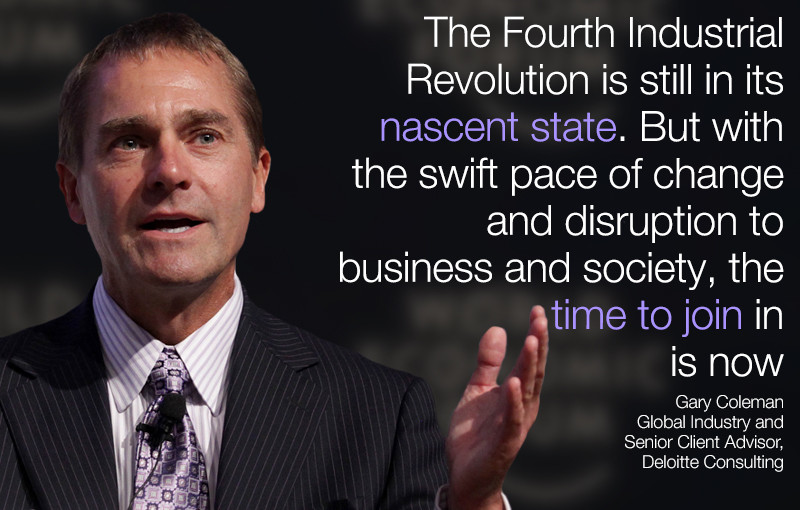The Fourth Industrial Revolution is already here

Image: REUTERS/Steve Marcus
If you’re still merely talking about the Fourth Industrial Revolution, you can stop theorizing, because it’s already here and is making an impact on business and society. With the digital transformation of manufacturing well under way, the only thing needed to launch the next industrial revolution is wider access to technologies such as robotics, artificial intelligence, sensors, 3D printing, nanotechnology and quantum computing. And now that these technologies are more affordable and their size more manageable, the Fourth Industrial Revolution is off and running.
The World Economic Forum’s Annual Meeting in Davos is focused on this industrial revolution for good reason. Consider these statistics. The 4.9 billion items connected to the internet of things last year will reach 25 billion by 2020. Advanced manufacturing technologies are expected to double in value to $85 billion-plus globally by 2019. Venture capital investment in robotics and artificial intelligence has grown more than 70% per year since 2011.
But to the naked eye, it may be hard to discern this revolution.
For example, take innovation. With the technologies at our disposal today, the design and testing of ideas is now much easier, enabling an accelerated innovation cycle. One major car company is using virtual reality to test out new designs in near real-time instead of waiting for physical prototypes. The data that is now gathered via ever-proliferating sensors can be analysed using machine learning and predictive analytics – allowing innovators to better assess the potential impact of their ideas.

This industrial revolution is also prompting new business models. Data and analyses generated by sensors and super-computers are now becoming business offerings in their own right. A real estate listing site may use its data to analyse and predict housing prices. Or a seed company can use its research paired with predictive modeling to provide specialized planting recommendations. This exponential ability may even transform physical producers into information providers and enable others to enter a field with little capital investment.
And while we’ve all heard that technologies like artificial intelligence will eliminate jobs, what we don’t hear about is the current lack of people who can design, build and maintain exponential technologies. This type of talent is already being fought over by the largest tech companies, with some enterprises funding academic centres and professorships to cultivate talent. This kind of thinking will be critical given predicted shortages – in the United States alone, it is estimated there will be 1.4 million computer specialist job openings by 2020 and only enough graduates to fill about 30% of those.
To be sure, the Fourth Industrial Revolution is still in its nascent state. But with the pace of change and disruption to business and society so swift these days, the time to join in is now.
Author: Gary Coleman is the Global Industry and Senior Client Advisor for Deloitte Consulting and lead partner in Deloitte’s strategic relationship with the World Economic Forum. Follow him on Twitter @gcoleman_gary. He is participating in the World Economic Forum’s Annual Meeting in Davos.
Don't miss any update on this topic
Create a free account and access your personalized content collection with our latest publications and analyses.
License and Republishing
World Economic Forum articles may be republished in accordance with the Creative Commons Attribution-NonCommercial-NoDerivatives 4.0 International Public License, and in accordance with our Terms of Use.
The views expressed in this article are those of the author alone and not the World Economic Forum.
Forum Stories newsletter
Bringing you weekly curated insights and analysis on the global issues that matter.
More on Forum InstitutionalSee all
World Economic Forum
May 16, 2025
Victoria Masterson, Stephen Hall and Madeleine North
March 25, 2025
Lorez Qehaja
March 19, 2025





